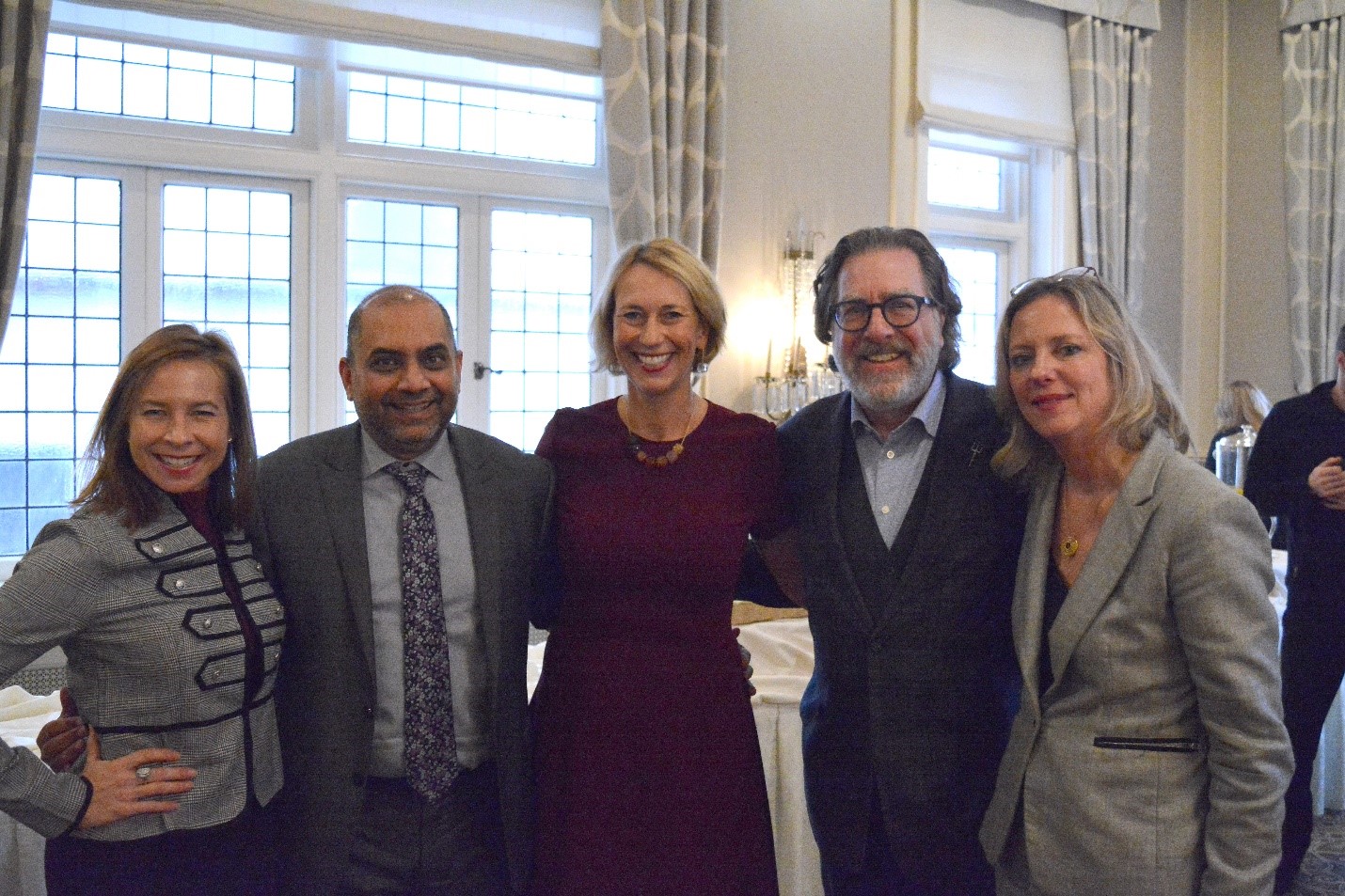
By Eleanor Allen, Parametrix Board Member and CEO at Water For People
Although water is abundant in nature, the amount of water available to drink and sustain life on earth is fixed and is becoming increasingly more strained as demand for water increases with population growth and development. Leveraging reliable and robust
technology, financing, and data to innovate every part of the water cycle – from sourcing to treatment to consumption to reclamation – is an absolute necessity to protect and manage our finite supply of water for future generations.
At the Future of the Profession event hosted by Parametrix in Seattle on November 19, 2019 (which also happened to be World Toilet Day!), leaders from across the industry were invited
to discuss how technology is changing the water industry and what this means for the future.
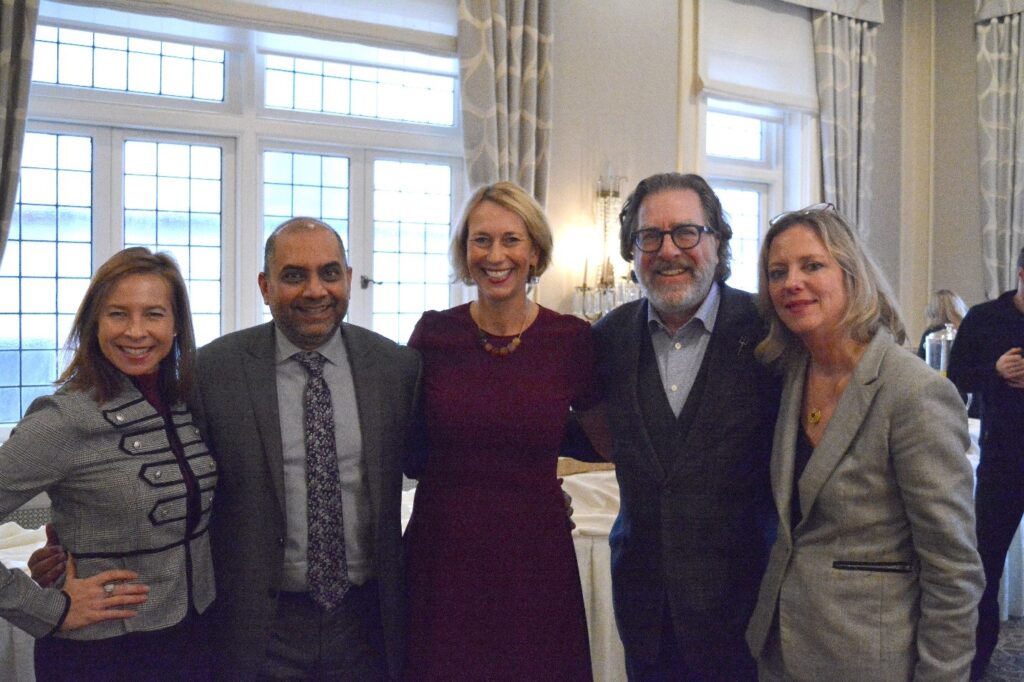
After setting the stage on water issues facing the Pacific Northwest (i.e., increased glacial melt, warmer winters, changing streamflows, increase in king tides, and optimization of water and wastewater utilities to incorporate smart water technologies
such as metering, monitoring, and data analytics into operations), each panelist introduced their area of expertise and their views on Smart Water:
- Rebekah – what the future of water could look like with regards to how a water utility could operate in terms of digitalization such as digital twining and the Internet of Water
- Sudhir – what is on the horizon for future of water/wastewater treatment for resource recovery, reduced leakage, and carbon neutrality
- Debra – how can we finance and promote innovation in the water sector infrastructure and technology
- Will – what trends can we expect to see in near future in shifts from water stewardship to a water strategy, especially in the intersection of corporate water strategy and water technology innovation
We then moved onto a Q&A-style informal discussion. And of course, no discussion about water is complete without touching on the every-changing world around us with regard to extreme weather events.
Our children are worried about climate change and the future we are leaving for them.
As we transitioned from introductions to questions, we shared our similar experiences related to younger generations and their increasing concerns about water-related climate change and the slow pace of change globally to react to the climate emergency.
Some young adults are choosing to forgo learning how to drive and don’t plan to have children to reduce the human impact on the planet. That’s a bigger conversation, so for now we moved into our panel’s area of expertise –
Smart Water.
Are you an elephant herder?
Sudhir kicked off the discussion with an elephant, horse, and hare (and sometimes fruit fly) metaphor to compare the rate of technology development and innovation in the water sector. Think of water infrastructure as these animals – elephants are
the large, unchanging technologies (such as water pipes in the ground and treatment plants), horses are the machines that revolutionized the water industry (electrical and mechanical systems), and the hares (or fruit flies) are the fast changing technologies
such as meters, sensors, etc. Fruit flies are those technologies that have such a short life span that often once implemented have already become obsolete (i.e., software systems).
In today’s fast-paced and ever-changing market, we must learn to be elephant herders but also know how to catch hares and incubate fruit flies.
Fruit flies who live another day…
The panel then launched into a discussion of their horses, hares, and fruit flies. Will discussed the fruit flies. These advanced technologies are created by people who are excited about new ideas and truly want to change the world. Often these technologies
are created by start-up companies may not have a business plan or a team, but they have great ideas. So taking on these “fruit flies” can be challenging, but when we can find a real use case, it can be extremely rewarding and game-changing.
However, deciding which fruit flies should live to see another day and which should die is an important role in technology innovation and incubation. Real-time water quality testing via smart phone applications and in-situ robotic leak detection for
plastic pipes are two examples of thriving fruit flies. Will also noted that technological advances in the water sector don’t necessarily follow a linear process – it’s messy and iterative. The good news is the future is here, and
the circular economy is within reach, but are we ready for it in the United States?
“Walmartization” of Water Utilities
Sudhir began a discussion around the “Walmartiziation” of water utilities. He says this is what we’re seeing in the U.K. where consolidation of multiple public utilities occurred in 1989 to create 10 private regional water authorities.
This is much different than the public water utilities system in the U.S. as the focus of the regional water authorities is to optimize operations through economies of scale. This drives innovation. Debra McCoy noted that the sad truth in the U.S.
is that Silicon Valley has done little to innovate in the water sector, mainly because investors don’t see the value in it. Theoretically, if we allowed for innovation in water, the next step would be the “Amazonification” of water
that really caters to customer needs. The key is figuring out how we get there.
Creating a Smarter Water System
I then asked the panel how we could optimize water with machine learning, artificial intelligence, etc. to create smarter water systems. Rebekah broadened the discussion to say that we are currently living in a world driven by humans and supported by
technology – in the future we will be living in a world driven by technology and supported by humans. What does this mean? We’ll need to completely change the way we work and how we look at things. This means letting technology take over
the data analysis and letting humans implement the changes that the data indicates are needed. Another challenge is that currently, the water industry is project-based rather than service-based. Many parallel projects overlap or duplicate each other.
We’ll need to think about the way we position our sector in order to fully reap the benefits of new technology and look at water services at the system level – from source to use to reuse – in a more collaborative way.
Changing Policies to Accelerate Technology Adoption
What policy, law, or regulation would you change to accelerate the rate of change in the water sector? This was the last question I posed to the panel. A common theme in their responses was that we aren’t recognizing the true cost of water. Water
service delivery in the U.S. is subsidized so the consumer, as well as investors, aren’t aware or interested in the real cost. What we pay is so minimal it isn’t an area that we pay much attention to. If the full cost – including
the cost of innovation, treatment, conservation, distribution, etc. were included in the price we pay to our local water utility for the water we use then water technology investors would see a higher return on their investment in research and development.
Today we take our access to high quality water and wastewater services for granted because they are always there. A reliable and “invisible” service that is quite complex and expensive to provide. If we had a way to promote more innovation,
the total true cost of water would ultimately reduce because our systems would become more efficient. By artificially de-risking water with subsidies in our current context, we’re not able to bring in outside money from investors that would
allow market forces drive innovation.
In closing I added that in contrast to the U.S., the work we do at Water For People in low and middle-income countries in Africa, Latin America, and Asia does not benefit from government
subsidies for water service delivery because they are simply not available. While this is a challenging context to work, it also drives innovation and requires that the water treatment and distribution systems be simple, with low capital and operation
and maintenance costs, because the consumer does pay the true cost of water and it must be affordable for all.
To close the discussion, we asked the audience to respond to a few questions. Here are the results:
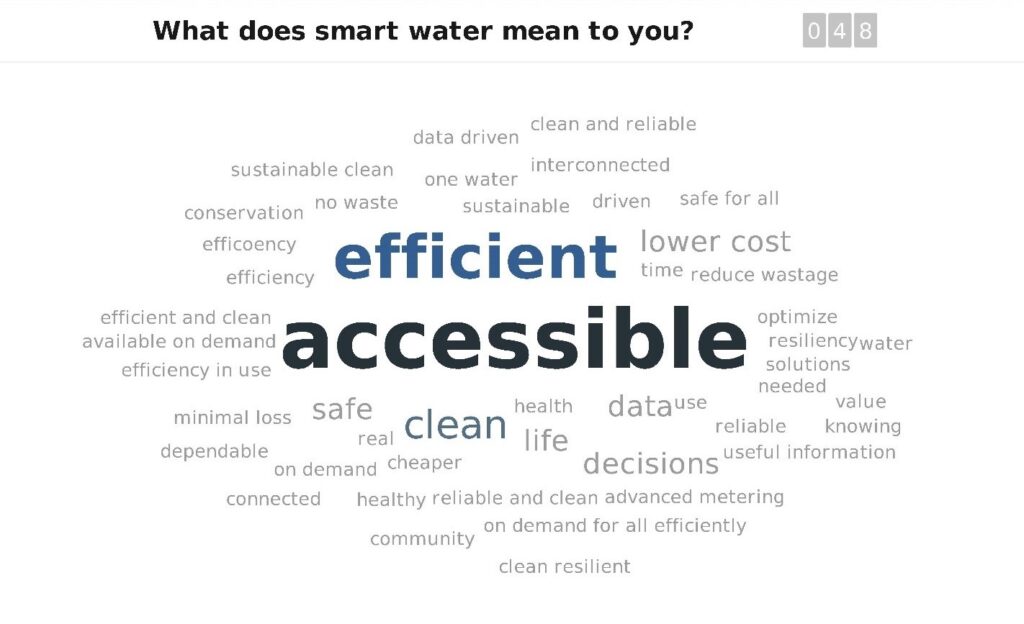
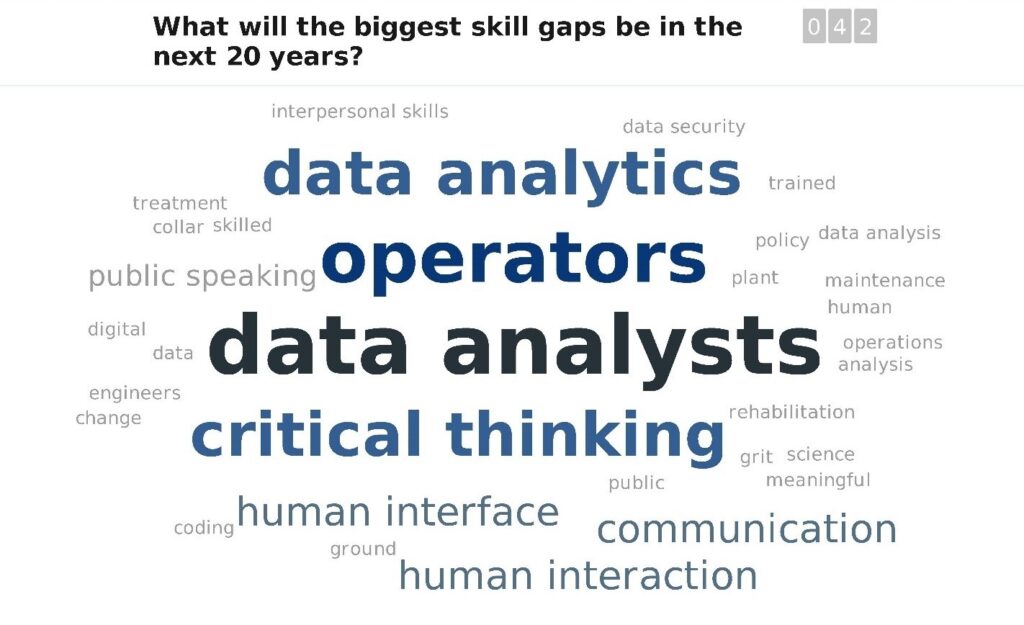
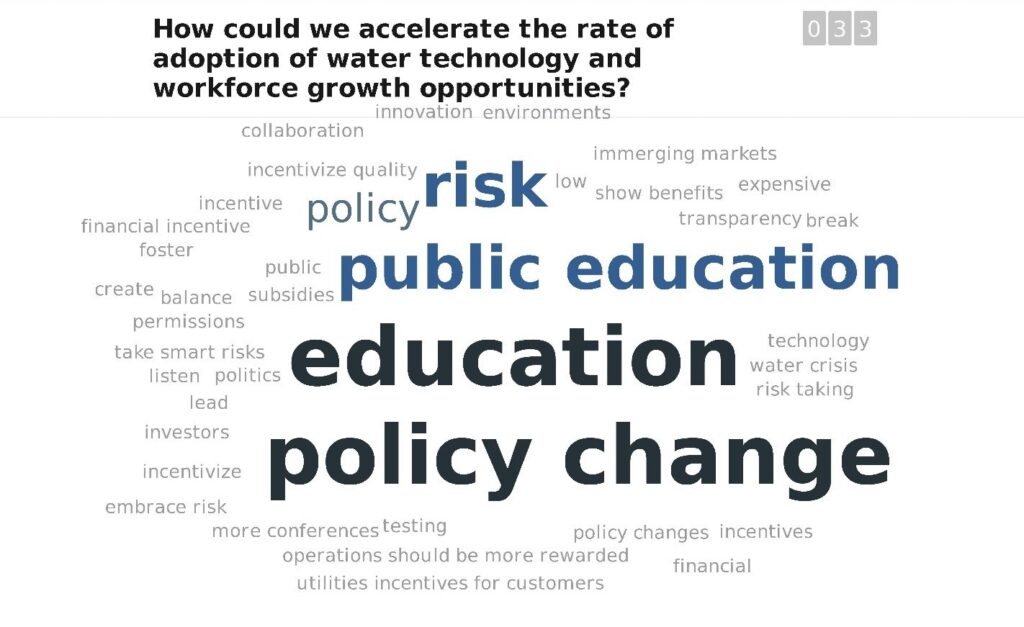
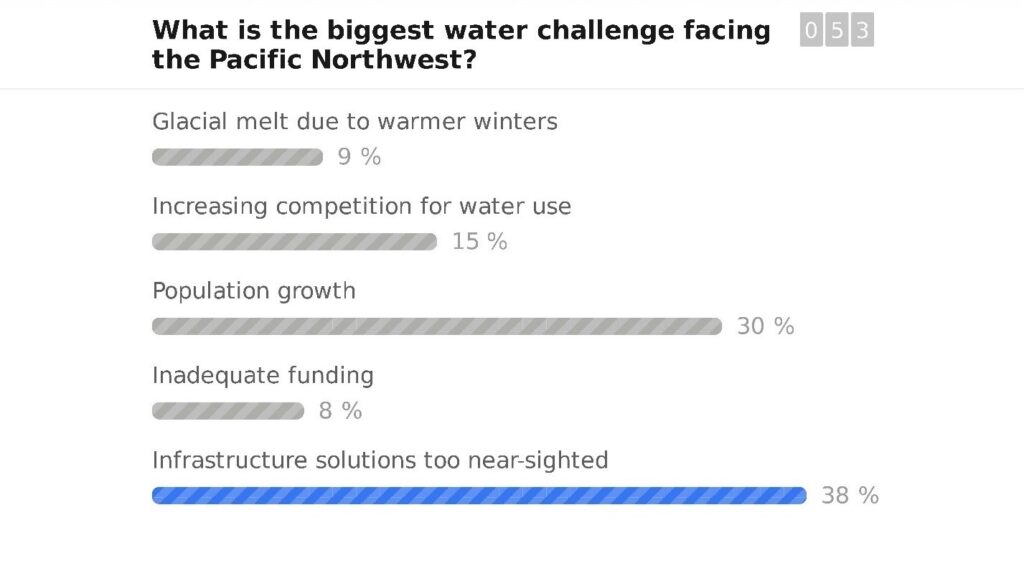
The full video recording of the session is below.
Thank you to these panelists for being a part of the 2019 Future of the Profession event.
Panelists

Debra Coy | Partner, XPV Water Partners
Debra is a Partner with XPV Water Partners, the largest water-focused growth equity fund in North America, with $400 million in assets under management. She works with growth companies utilizing her experience as a top-ranked investment research analyst and strategic consultant to investors, companies, and municipal utilities. Debra is well known in the water industry from her 20 years on Wall Street as an equity research analyst, where she developed a leading franchise and broad expertise in covering the global water markets for investors at firms including Janney Montgomery Scott, Schwab Capital Markets, HSBC Securities, and National Westminster Bank. She serves on the Board of Directors for AquaVenture Holdings, Global Water Resources Inc., and Willdan Group Inc., and is a regular speaker and columnist on water industry finance and innovation.

Rebekah Eggers | Business Partnerships and Transformation Executive, IBM Watson
Rebekah has responsibility for IBM Global Market’s Transformation Initiatives for Energy, Environment, & Utilities and is a trusted utility industry professional based in Los Angeles with a 20-year track record of strong solution leadership. She mobilizes the IBM global and partner ecosystem capabilities to create business value, leveraging her experience managing complex initiative design while operating in intense, results focused environments. Rebekah is known for creating sustainable go-to-market and portfolio leadership for solutions that leverage data and analytics, improve operational efficiencies, and deliver customer satisfaction, ultimately enabling high performance teams. She is sought out as a strategic advisor, keynote speaker, and for engaging dialogue at industry events across the globe.

Sudhir Murthy, Ph.D. | CEO, NEWhub and Senior VP, International Water Association
Sudhir is an experienced executive with a demonstrated history of introducing new technologies at water utilities. He has expertise in innovation management, water and wastewater treatment, environmental process engineering consulting and technology development and commercialization. He is the CEO of NEWhub, an adjunct senior research scientist at Columbia University studying innovation systems for water utilities and water and wastewater treatment research, and the senior vice president of the International Water Association. NEWhub is a cleantech company that specializes in managing technology and know-how for licensed distributors and helps utilities navigate their internal innovation and planning process. Previously, Sudhir was innovations chief for DC Water and for 16 years led the development and implementation of the Authority’s innovation strategy.

Will Sarni | Founder and CEO, Water Foundry
Will is an internationally recognized thought leader on water strategy and innovation. He has been a sustainability and water strategy advisor to multinationals, water technology companies and NGOs for his entire career. Will works with multinationals on corporate water strategies, water technology innovation and water market entry strategies. His work with water technology companies is as a strategy advisor and investor. Will has written numerous books and articles and presents on subjects such as the value of water, innovations in digital water technology, the circular economy, and the energy-water-food nexus. Will is a Board Member of FloWater, Project WET, Project Board Member of 10.10.10, and Founder and Chairman of WetDATA.org. He was a 2016 XPRIZE Bold Visioneer for the Safe Drinking Water Team and is on the Scientific Program Committee for Stockholm World Water Week; the Executive Council of NOAA’s National Integrated Drought Information System (NIDIS); the Editorial Board of the Journal of Water Security and a Technical Advisor for the Climate Bonds Initiative: Nature-Based Solutions for Climate and Water Resilience.
About the Author

Eleanor Allen, PE
CEO, Water for People and Board of Directors, Parametrix
Eleanor serves as CEO of Water for People, a non-profit organization committed to providing access to reliable and safe water and sanitation services in nine countries across Latin America, Africa, and Asia. She also serves as a member of Parametrix’s Board of Directors. Eleanor began her career as a Peace Corps volunteer in the Dominican Republic. She then spent nearly 20 years as a consulting engineer with CH2M and ARCADIS, specializing in water/wastewater treatment as well as program management, business development, and operations.
